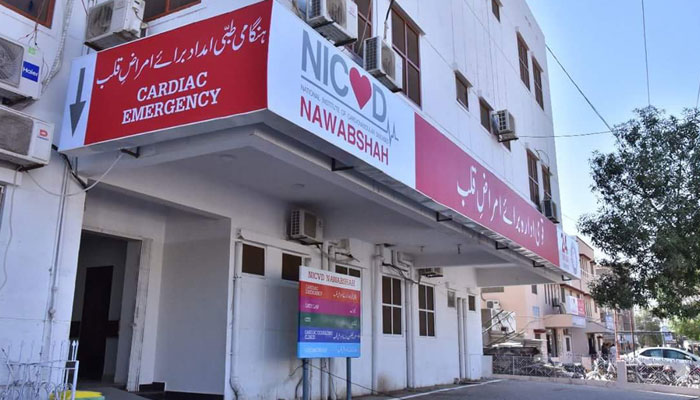First time in Pakistan, NICVD performs ‘focal cryoablation’ procedure successfully
The National Institute of Cardiovascular Diseases (NICVD) has achieved a milestone in cardiac healthcare by performing the first “focal cryoablation” procedure on a 60-year-old woman from Lahore who was suffering from a fast heart rate for years, saying the patient is now cured of her cardiac problem.
The procedure was performed by a team led by Dr Azam Shafqat, a professor of cardiac electrophysiology, at the hospital. Prof Shafqat said the procedure was performed successfully without any complications, and the patient with heart rates of up to 200 per minutes for a long time had successful ablation of the abnormal focus, and now had a normal heart rate.
Most such procedures are performed by heating the focus abnormal beat in the heart tissue by a catheter. In this case, the abnormality was in such a location that heating could destroy normal tissue, causing an excessively slow heart rate.
“For the first time in Pakistan, a special catheter was used to freeze the focus of abnormality at -70 ºC without the risk of slow heart rate. This freezing was successfully performed without any complications. The patient permanently cured of this cardiac ailment,” Prof Shafqat said.
Appreciating the cardiac electrophysiology team of the institute, Prof Nadeem Qamar, executive director, NICVD, said the hospital had achieved another milestone by performing the “focal cryoablation” procedure for the first time in the country.
The “National Institute of Cardiovascular Diseases has become one of the best tertiary cardiac care hospitals in the world,” he added.
It is not the first such unique and complicated procedures performed at the cardiac institute in Pakistan, as almost a year back, in July 2018, surgeons had carried out the first successful implant of a mechanical pump known as Left Ventricular Assist Device (LVAD) in the chest of a female patient whose heart was not functioning properly and required mechanical support to pump blood in her body. Prof Qamar and transplant surgeon Dr Pervaiz Chaudhry, who joined the NICVD after quitting his job in the United States and led implant surgery, say they had “inserted” an artificial heart in the chest of the elderly female patient, who was doing fine after the surgery.
Prof Qamar vows that their ultimate goal is achieving the target of heart transplants in Pakistan, saying that within the next one or two years, surgeons would be able to perform heart transplants at the NICVD.
LVAD implant costs around 11-12 million rupees, but not a single penny is being charged from any patient seeking cardiac treatment and costly surgical procedures at the NICVD.
Earlier in 2015, the NICVD conducted the very first successful trans-catheter aortic valve implantation (TAVI) procedure, a minimally-invasive procedure similar to an angioplasty. It is performed to repair old and damaged heart valves without removing them through a small opening in the patient’s groin.
The TAVI procedure was conducted on in August 2015 at the NICVD and the surgeons included Dr Ahmed Elsayed, a consultant interventional cardiologist and lecturer at Ain Shams University of Egypt. Other members of the NICVD doctors’ team included Dr Syed Nadeem Rizvi and Dr Tahir Sagheer.
According to Dr Qamar, whenever a patient requires an aortic valve replacement it requires an open-heart surgery. However, he said, with the TAVI the damaged heart valve could be repaired through a very small opening in the groin of the patient. “Instead of open-heart surgery, the procedure involves wedging a replacement valve in place of the aortic valve,” he said. “The NICVD is proud to be the first institute in Pakistan to have conducted a successful TAVI procedure. We plan to use this method on a routine basis from now.”
-
 Dwayne Johnson Confesses What Secretly Scares Him More Than Fame
Dwayne Johnson Confesses What Secretly Scares Him More Than Fame -
 Elizabeth Hurley's Son Damian Breaks Silence On Mom’s Romance With Billy Ray Cyrus
Elizabeth Hurley's Son Damian Breaks Silence On Mom’s Romance With Billy Ray Cyrus -
 Shamed Andrew Should Be Happy ‘he Is Only In For Sharing Information’
Shamed Andrew Should Be Happy ‘he Is Only In For Sharing Information’ -
 Apple Sued Over 'child Sexual Abuse' Material Stored Or Shared On ICloud
Apple Sued Over 'child Sexual Abuse' Material Stored Or Shared On ICloud -
 Nancy Guthrie Kidnapped With 'blessings' Of Drug Cartels
Nancy Guthrie Kidnapped With 'blessings' Of Drug Cartels -
 Hailey Bieber Reveals Justin Bieber's Hit Song Baby Jack Is Already Singing
Hailey Bieber Reveals Justin Bieber's Hit Song Baby Jack Is Already Singing -
 Emily Ratajkowski Appears To Confirm Romance With Dua Lipa's Ex Romain Gavras
Emily Ratajkowski Appears To Confirm Romance With Dua Lipa's Ex Romain Gavras -
 Leighton Meester Breaks Silence On Viral Ariana Grande Interaction On Critics Choice Awards
Leighton Meester Breaks Silence On Viral Ariana Grande Interaction On Critics Choice Awards -
 Heavy Snowfall Disrupts Operations At Germany's Largest Airport
Heavy Snowfall Disrupts Operations At Germany's Largest Airport -
 Andrew Mountbatten Windsor Released Hours After Police Arrest
Andrew Mountbatten Windsor Released Hours After Police Arrest -
 Heidi Klum Eyes Spooky Season Anthem With Diplo After Being Dubbed 'Queen Of Halloween'
Heidi Klum Eyes Spooky Season Anthem With Diplo After Being Dubbed 'Queen Of Halloween' -
 King Charles Is In ‘unchartered Waters’ As Andrew Takes Family Down
King Charles Is In ‘unchartered Waters’ As Andrew Takes Family Down -
 Why Prince Harry, Meghan 'immensely' Feel 'relieved' Amid Andrew's Arrest?
Why Prince Harry, Meghan 'immensely' Feel 'relieved' Amid Andrew's Arrest? -
 Jennifer Aniston’s Boyfriend Jim Curtis Hints At Tensions At Home, Reveals Rules To Survive Fights
Jennifer Aniston’s Boyfriend Jim Curtis Hints At Tensions At Home, Reveals Rules To Survive Fights -
 Shamed Andrew ‘dismissive’ Act Towards Royal Butler Exposed
Shamed Andrew ‘dismissive’ Act Towards Royal Butler Exposed -
 Hailey Bieber Shares How She Protects Her Mental Health While Facing Endless Criticism
Hailey Bieber Shares How She Protects Her Mental Health While Facing Endless Criticism




